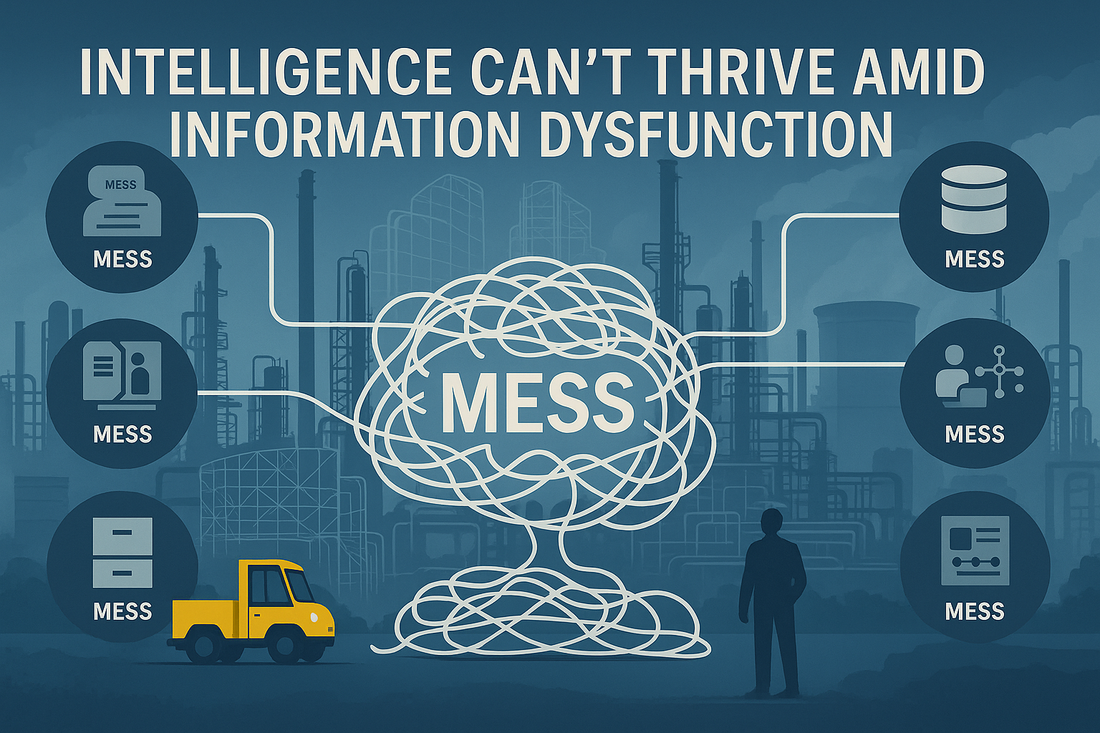
Intelligence Can't Thrive Amid Information Dysfunction
Rob RitchieYou Can’t Be Intelligent on Top of a Mess
Most organisations today are drowning in information and data—from documents and dashboards to system logs and sensor feeds—and no one is steering the ship. In a world where intelligence is the new operating model, the raw material that fuels it—our information and data—is increasingly unfit for purpose.
Across industries, companies are sitting on millions of documents and data streams. PDFs, spreadsheets, PowerPoint decks, ERP exports, IoT feeds, transactional logs. Scattered across inboxes, file servers, dashboards, cloud platforms, and APIs. Some of it is as old as the company itself. No one looks at it anymore, but no one’s brave enough to delete it either. The context is gone, the owners have moved on, and we’ve lost the ability to tell what’s important.
So what do we do? We keep it. And when we can’t trust what’s already there, we make more.
We don’t reuse. We recreate.
We don’t maintain. We start again.
Every new hire adds more. Every project adds more. And every person is left to figure out, on their own, where and how to manage it all.
A Strategy of Silence — How We Let the Chaos Take Over
Most organisations don’t onboard people into an information management strategy—because most don’t have one. Instead, we rely on individual judgment. Want to store your files in email? Fine. SharePoint? Go for it. Local folder? Sure. Intranet? Also fine. How about Teams or OneDrive or the desktop? Why not.
We’ve convinced ourselves that self-management is a strategy. It’s not.
The Lone Champions of Order — And Why They Keep Losing
Every so often, someone tries to fix it. They see the chaos. They care. They try to bring in structure—standards, rules, tools. Maybe they even get a project funded. But most of the time, they’re left fighting alone. There’s no executive sponsorship. No cultural shift. And eventually, no progress.
The Hidden Tax — What Disorganisation Really Costs
The impact is bigger than most realise. People lose hours chasing versions. Projects slow down. Decisions get made on bad information. And we duplicate the same work again and again.
Some estimates suggest up to 50% of knowledge worker time is wasted in the noise. That’s not a rounding error—it’s a systemic drag on productivity.
The Limits of Traditional Information Management
As the volume, velocity, and variety of information continue to grow, traditional approaches to managing it simply won’t scale. The old ways—manual filing, folder hierarchies, scattered ownership, or relying on individuals to remember where things are—were never designed for this complexity.
To thrive in this new era, organisations need to rethink their information management foundations. That means updating the practices, tools, and governance models that support how information is captured, organised, trusted, and shared. It means designing systems that adapt to change, support continuous discovery, and embed intelligence—not just storage.
This is the subject of a future post. But the message is clear: modern information challenges require modern information practices.
You Can’t Build Intelligence on a Swamp
If your organisation is pursuing automation, AI, or digital transformation, here’s the truth:
Your tools are only as good as the data and information they touch—whether it’s human-generated or machine-produced.
Poor information management isn’t just a tech debt—it’s a strategic liability. You can’t automate a mess. You can’t scale chaos. And you can’t generate intelligence from systems that don’t know what they’re looking at.
The Path to Information Intelligence — And Why It Matters Now
We call the new way forward Information Intelligence—a deliberate, structured, disciplined approach to managing and leveraging information as a strategic asset.
It’s not a quick fix. But it’s the only way out.
The mess won’t clean itself.
And the future won’t wait for us to get ready.
Clean up your mess.
